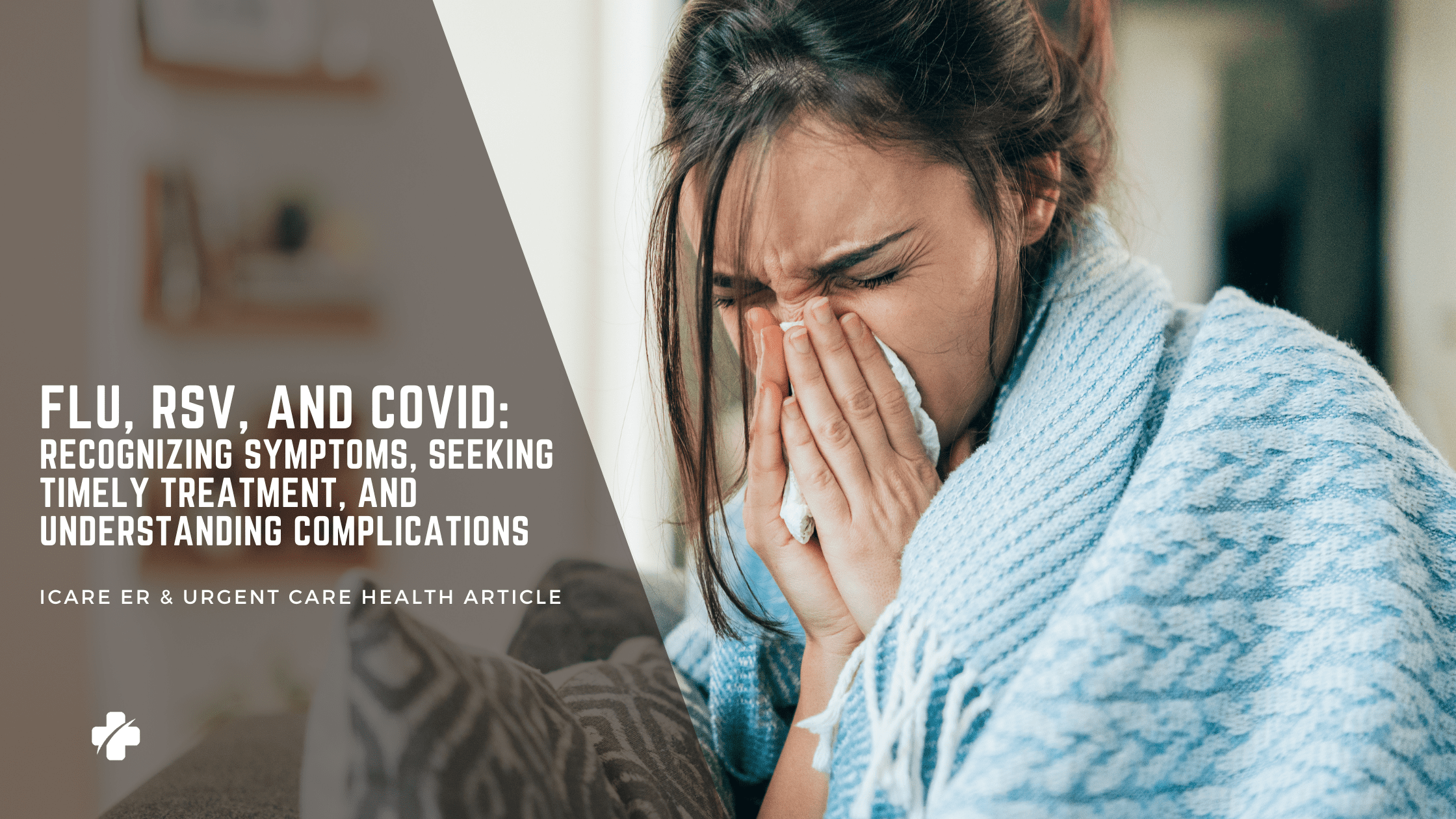Flu, RSV, and Covid: Recognizing Symptoms, Seeking Timely Treatment, and Understanding Complications

Flu, RSV, and Covid: Recognizing Symptoms, Seeking Timely Treatment, and Understanding Complications
Introduction: In the ever-evolving realm of healthcare, staying well-versed in prevalent respiratory illnesses is crucial. At iCare Emergency Room & Urgent Care, we are devoted to prioritizing your health and well-being by offering comprehensive care for a diverse array of medical needs. In this in-depth exploration, our goal is to provide a thorough understanding of the symptoms, treatment options, and potential complications associated with the flu, RSV (Respiratory Syncytial Virus), and Covid-19.
Flu (Influenza):
Caused by the influenza virus, the flu targets the respiratory system, affecting the lungs, nose, and throat. Elevated risk groups include young children, older adults, pregnant women, and individuals with chronic diseases or compromised immune systems.
Symptoms: The Flu Can manifest with a range of symptoms, including fever, chills, cough, sore throat, body aches, fatigue, and respiratory distress. Identifying these symptoms promptly allows for timely intervention.
Complications: Possible serious complications triggered by the flu can include inflammation of the heart (myocarditis), brain (encephalitis) or muscle tissues (myositis, rhabdomyolysis), and multi-organ failure (e.g., respiratory and kidney failure).
Treatment: Antiviral medications are available, complemented by rest, hydration, and over-the-counter symptom relief. Vigilance is crucial, as complications may include pneumonia, bronchitis, sinus infections, and exacerbation of chronic medical conditions.
RSV (Respiratory Syncytial Virus):
Respiratory syncytial (sin-SISH-uhl) virus, or RSV, is a common respiratory virus that typically causes mild, cold-like symptoms. Most people recover in a week or two, but RSV can be serious.
Symptoms: RSV primarily affects the respiratory system, leading to symptoms such as congestion, cough, wheezing, fever, and difficulty breathing.
Complications: RSV can also cause more severe infections such as bronchiolitis, an inflammation of the small airways in the lung, and pneumonia, an infection of the lungs. It is the most common cause of bronchiolitis and pneumonia in children younger than 1 year of age.
Treatment: Supportive care, including oxygen therapy and intravenous fluids, is commonly employed. Antiviral medications may be considered in specific cases. Complications may include severe respiratory infections, pneumonia, and bronchiolitis, especially in vulnerable populations.
COVID-19 (Coronavirus):
The Coronavirus is a disease caused by a virus named SARS-CoV-2. It can be very contagious and spreads quickly. The ongoing global pandemic has brought Covid-19 to the forefront of healthcare concerns.
Symptoms: Symptoms of COVID-19 encompass fever, cough, shortness of breath, fatigue, loss of taste or smell, and body aches.
Complications: COVID-19 complications can range from severe respiratory distress and acute respiratory distress syndrome (ARDS) to multi-organ failure. The risk of developing dangerous symptoms increases with age, with those who are age 85 and older are at the highest risk of serious symptoms.
Treatment: Supportive care involves rest, hydration, and, in severe cases, hospitalization with oxygen therapy.

When to Seek Urgent Care or Emergency Room Services:
Understanding the appropriate level of care is crucial for effective management of respiratory illnesses.
Urgent Care: Mild symptoms, such as a mild cough, low-grade fever, or congestion, may warrant a visit to urgent care during regular business hours for prompt evaluation. Non-emergency situations are best addressed through timely and thorough assessment.
Emergency Room: Severe symptoms demand immediate medical attention. High fever, difficulty breathing, chest pain, confusion, persistent vomiting, or bluish lips/nails are indicators that require urgent care. In these instances, seeking emergency room services is paramount for comprehensive evaluation and treatment.
At iCare ER & Urgent Care, we pride ourselves on being equipped to handle both urgent care needs and medical emergencies. Our state-of-the-art facilities located in Frisco, Forney and Fort Worth, TX, provide a convenient and accessible option for your family’s healthcare needs.
Conclusion: In conclusion, a nuanced understanding of the symptoms, treatment options, and potential complications associated with flu, RSV, and Covid-19 empowers individuals to make informed decisions about seeking medical care. iCare Emergency Room & Urgent Care remains steadfast in its commitment to providing high-quality, immediate care for you and your loved ones. Your health is our priority, and we are here for you at every step of your healthcare journey.
FOLLOW US ON SOCIAL FOR MORE RELEVANT,
LOCAL HEALTH INFORMATION